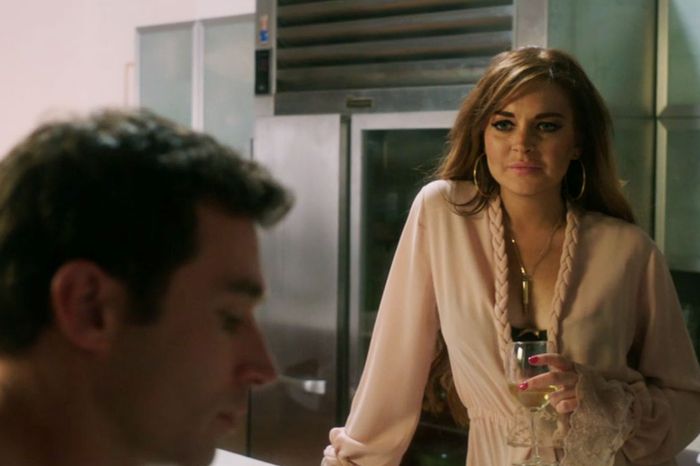
There is a moment in 2013’s The Canyons — the Paul Schrader and Bret Easton Ellis film rejected by the Sundance and South by Southwest film festivals, critically panned upon release, and starring and produced by Lindsay Lohan in that decade or so of post–Mean Girls reinventions — when Lohan lets us know she’s in on the gag.
In the erotic thriller, Lohan plays a former ingénue who everyone now describes as staggeringly beautiful but slightly vacant. She mainly just shops and lays around, both inviting and resenting people’s attention. She talks about the movie as a dying art form: “Maybe it’s just not my thing anymore. Now I’m looking for something else to do.” The line seems to bait comparisons to Lohan’s own then-stalled trajectory from Disney child star to tabloid staple, sleepwalking through roles in films like Chapter 27, I Know Who Killed Me, Labor Pains, and Machete. But in the middle of a sexual tryst that her boyfriend Christian (porn star James Deen) has set up with another couple, Lohan looks up and directly into the camera. Her sleepy-eyed gaze cuts through John DeFazio’s soft-focus cinematography, and her slow smile interrupts the swirling dots of neon light. I know what you’re thinking, that grin seems to say, and I don’t care.
Lohan is back in the mainstream now with a couple of holiday romances for Netflix: November’s Falling for Christmas and the upcoming 2023 release Irish Wish. Falling for Christmas, her first film in three years, has been framed as the erstwhile beach-club manager’s grand return to acting. But Lohan’s work in The Canyons as Tara, girlfriend to Deen’s conniving and abusive movie producer Christian, was a persuasive comeback attempt all its own. She brought a sly cognizance to a role that seemed to nod at her real-life dramatics — her on-the-outs relationship with Hollywood, her celebrity as spectacle — and prodded at the links between professional victimhood and personal responsibility. Her performance is the best part of a film often talked about in relation to the messiness of its production.
A January 2013 New York Times piece offers a snapshot of the crowd-funded film’s production chaos: Ellis dropped out of meetings to wage “one of his frequent Twitter wars.” Lohan disappeared for a few days entirely. Schrader fired her and then, when she begged to be rehired, acquiesced. There were on-set arguments. After the film’s release, Ellis complained about Schrader’s directing, while Schrader complained that Lohan had dropped out of promotional duties. In years since, Schrader, Ellis, and Deen have all embroiled themselves in scandals of varying severity. (The gravest concerned Deen, who in late 2015 was accused of abuse and sexual violence by nine women. Deen was never charged, and in a particularly bleak twist, returned to porn in a film titled Consent.)
The Canyons became an odd footnote in everyone’s careers. Admittedly, there are elements of the film that are impenetrably puzzling. Ellis’s script, though well-layered in its paranoia, often feels overly familiar to his own previous sexual satires, like The Rules of Attraction. Deen’s performance is excessively affected, too reliant on cocked eyebrows and half-smirks to communicate menace. The final shot is a surprise; the third act leading up to it, not so much.
But Lohan is so sure of herself in The Canyons that she bends the film to her will and, somewhat contradictorily, invigorates it with her specific brand of exhausted wariness. You see it in the way she angles her body away from Deen’s in the film’s opening dinner scene, and the cool laziness with which she blows cigarette smoke at one of Christian’s former lovers. You see it when her face collapses into crumpled tears as Tara offers her body to her ex, Ryan (Nolan Funk), the one man she might actually love.
Lohan’s choices here are double-edged: Whether the script calls for Tara to be anxious and wary, smug and sensual, or resentful and disinterested, Lohan is simultaneously overripe and naturalistic. As the men fighting over her, Deen and Funk play their roles straight: jealousy, megalomania, typical macho bullshit. Lohan, though, balances her character and the real-life persona she both cultivated and combated, and it’s her winking engagement that draws us in.
That sex scene is the most blatant example of Lohan’s meta dynamism, but she brings that quality to nearly every scene; it’s visible once you start looking for it. Her aura of lived-in disappointment gives The Canyons an advantageous cynicism about Hollywood and who survives there. During the increasingly “edgy” scenarios Christian sets up with strangers, Schrader’s camera focuses on Lohan’s face. It transforms in a split second from aroused to blasé, participant to voyeur, subject to object. She adds a special venom to inward-looking dialogue: “I guess I’d like to keep some parts of my life private. Some aspects of my fucking life private”; “I need someone to take care of me. And I needed someone to take care of me.” Lohan seemingly vacillates between whether she actually wants to be in The Canyons or not, and that slippery sincerity adds a fascinating, perplexing layer to her character. Intentionally or not, The Canyons makes the case that Lohan possesses more self-awareness than we give her credit for, then or now.
The Canyons is streaming on AMC+.
More From This Series
- The Renegades Who Made A Woman Under the Influence
- The Six-Movie Season That Turned Jude Law Into an Oscars Punchline
- ‘Paul Simon Probably Thought I Was a Seat Filler’


